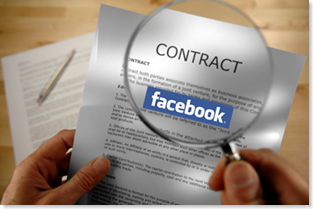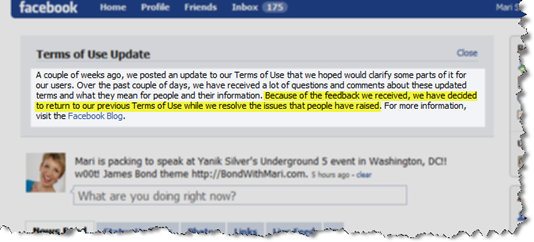Does Facebook Really Own Your Data? NO! It’s About Openness
BREAKING: UPDATE: February 17, 2009, 11:20 PM Pacific
I just logged into Facebook and they have this update posted right there on the Home Page announcing they’ve decided to revert back to the previous Terms of Use while they “resolve the issues that people have raised”:
Way to go Facebook members for speaking out and being heard. Hopefully we’ll see more clearly worded TOS.
[Original post follows]
 I’ve been watching the hoopla and panic on the web and in the Twitterverse today regards Facebook‘s recently (slightly) revised Terms of Use.
I’ve been watching the hoopla and panic on the web and in the Twitterverse today regards Facebook‘s recently (slightly) revised Terms of Use.
The main change folks are reacting to is the perception that everything you load to Facebook suddenly belongs to Facebook. Not so.
The moment you sign up for an account on Facebook, you ARE agreeing to their Terms of Use, which includes a clause that you grant Facebook a license to use your content.
Yes, the license is “irrevocable, perpetual, non-exclusive, transferable, fully paid, worldwide (with the right to sublicense).” Phew, we can see why so many members are upset because of all the implications and permutations this clause could mean.
And, yes, it does seem unfair to have members sign up for a service under one set of Terms and then to change them sitewide, even if moderately. As Facebook’s Corporate Counsel for Commercial Transactions, Suzie White, explained Facebook are working on consolidating their Terms.
Interestingly enough, I raised this very issue last month when I attended the Affiliate Summit West in Las Vegas where one of the panels addressed legal matters in social media. Slides included screenshots of the TOS of giants like Facebook, MySpace, YouTube etc.
At Q&A time, I got up to ask a question on the mic, posed to one of the attorneys, specifically about Facebook’s Terms of Use – I asked if we are to interpret the TOS literally, Facebook are at complete liberty to do as they please with all users’ content.
Indeed, the attorney confirmed this to be the case. BUT, he quickly added words to the effect of: Facebook would be HIGHLY unlikely to ever utilize member content in any way inappropriate such that it would jeopardize the member experience of trust, safety and privacy. (Otherwise, they might just have a class action on their hands, yes?!)
See Facebook CEO and Founder, Mark Zuckerberg response to the outcry today: On Facebook, People Own and Control Their Information.
Excerpts:
Here’s the way I look at it:
1. Much as I’m one of Facebook’s biggest evangelists and I believe they’re here for the long haul, we have to remember there was life before Facebook. Sure it’s great to share a ton of stuff with friends, family, clients, peers around the world. But caveat emptor. Don’t be sharing anything anywhere online that you wouldn’t want exposed publicly in some way. My rule of thumb on Facebook, Twitter and beyond is: “Would I be cool with this showing up on the front page of the New York Times, found in a Google search or seen by my grandchildren in a couple decades’ time??” If ever the answer is no, the data simply does not go online.
2. With all due respect to many of my artist and creative friends in the Facebook community, I really feel photos of your artwork is safe on Facebook. It’s highly unlikely you’d walk into someone’s house one day and see a big coffee table book with your artwork published by Facebook. Believe it or not, Facebook really do care about their members and wouldn’t intentionally do something to upset or provoke their users. Adding a watermark to each image may help you feel safer. DISCLAIMER: I’m not an attorney, I’m not giving legal advice here at all – it’s important always to do your own due diligence.
3. For me, all the content I load to Facebook is for public display anyway: I love it that my photos are propagated around the platform in the feeds. I take photos and load them to Facebook on purpose for more visibility. I love it that my blog posts import as Notes and can be shared around Facebook and commented on. And, all my public videos are on YouTube and imported into Facebook. My status updates, wall posts and comments are all strategically written. I *want* droves of people to be looking at my content – and I invite anyone using Facebook for business networking to consider this strategy too.
4. Another thing, though I share a ton of content online for free, I’m also monetizing my intellectual property with my consulting services, products and training. I believe it is simply not possible to give away all your knowledge. And I highly doubt a third party giant like Facebook would be trying to profit from your IP. Though I don’t doubt they’ll use our data for market research purposes. Again, I’m cool with that as I’m sharing my data on Facebook of my own volition.
Bottom line, I really
encourage the Facebook TOS naysayers to put things in perspective. Facebook are listening. Mark Zuckerberg responded today. He’s had flack before (Beacon!) and has publicly apologized and put steps in place to rectify sticky situations in the past.
Facebook actually consider themselves still a startup! (Even at five years old and 165 million+ active users!) Just shows how much further they plan to go – I do know their #1 focus is growth.
What are your thoughts? Are you more reticent now about using Facebook? Do you think the revised TOS are harsh? How so? Add your comments below.
Related Posts:
- Facebook: All Your Stuff is Ours, Even if You Quit – Mashable.com
- Facebook: Relax, we won’t sell your photos – Cnet News
- Facebook: “We have never claimed ownership” of members’ content – The Standard
- Facebook’s Users Ask Who Owns Information – The New York Times
- Facebook terms of service compared with MySpace, Flickr, Picasa, YouTube, LinkedIn, and Twitter – Amanda French
- Facebook Clarifies Terms Of Service: “We Do Not Own Your Stuff Forever” – Consumerist





Mark wrote: “Instead of defending them, Mari, a “Facebook evangelist” should be demanding accountability from those whose Gospel she’s chosen to preach.”
I totally agree with Mark. As of now, Facebook has temporarily reverted back to its old terms of service. This, I feel, was in response to public outcry and certainly not to the message of “trust them.”
I also am truly concerned about the fact that Mari hosted a public teleseminar in January to an audience of hundreds of artists without, from what I can gather, apparently not consulting any legal experts on the topic of ownership of one’s images on this platform of Facebook.
Mari,
I arrived here by a link in Madalyn Sklar’s blog on the issue. As usual both of you are calm heads in a tempest in a teapot.
Molly’s last blog post.. Marketing Trends in Music 2009
Great post, Mari! I’m all for sharing my information but the bottom line is I allow what I choose to be public. If Facebook or any other social media site retains ownership it’s because I let them. People can decide to not use these sites. It’s that plain and simple. I for one embrace these sites and do not lie awake at night wondering if someone takes my e-Books and resells them for their own profit. I also don’t worry about Facebook taking my photos and selling them.
Madalyn Sklar’s last blog post.. Motivation will almost always beat mere talent!
Let’s make this simple: the issue here is OWNERSHIP.
This is not about openness. It’s not about sharing. It’s not about Facebook’s philosophy or intentions. It’s not about privacy. it’s not about trust.
The issue here is OWNERSHIP.
Who owns the photo you just posted to Facebook? By the current terms of service, they do — now and forever, without limit, world without end, amen.
Helping users share information doesn’t require a company to declare total, eternal, perpetual ownership of the information its users share … and that’s what Facebook has done, pure and simple.
Shifting the conversation to other issues — like privacy or access — helps muddy the water … but it does nothing to address what’s happened here.
Facebook has declared itself the eternal and perpetual owner of everything you share there. Instead of defending them, Mari, a “Facebook evangelist” should be demanding accountability from those whose Gospel she’s chosen to preach.
Mari:
I’ve been getting a lot of emails and messages about this too, particularly from artists. I agree with you that the promotional benefits of being visible far outweigh the risk of your photos and content suddenly being seiged or appropriated by Facebook. It’s a reasonable fear for many, but as you stated in this post, doesn’t merit hysteria. Thanks for shedding insight!
🙂
Nancy
great post, mari. it’s always good to keep things into perspective, and your bullet points were right on. i think there was a lot of misinformation out there (esp. on twitter), and you did an excellent job relaying the right information. thanks!
Your common sense approach to FB issues makes sense. Thanks for an alternative view to panic.
Yes, and Mari. Yes, stuff is public when you put it online. AND, I should have been informed, clearly, by FB when they were changing their terms. This is tone-deafness on their part. Did they not learn from Beacon and the fact that users want to know when, if an how their data would be used to serve ads to their friends, that this change might also rattle the cage?
I’m also about openness – but much of what I put up as open is on my website and linked from FB. And people kept asking me why I haven’t posted ’25 things’ about me on FB. Because,as you note, I don’t want them appearing over and over for years without control over them.
It takes a few times making users angry before a company starts to lose reputation points – and then eventually people, even if they use the product, assume the worst about a company – see Microsoft as an example.
FB needs to keep the startup mentality for innovation, but gain maturity about what their customers want when it comes to data and trust.
Howard Greenstein’s last blog post.. A useful list of Twitter tools
A lot of people like me put original music on Facebook. Why is so hard to believe that Facebook would put out a “Best of Facebook Music” collection, and not pay anyone?
As a professional writer, my take is simple: I don’t upload the material I own and wish to protect to Facebook’s servers. Instead, I upload it to my own servers and paste links into facebook.
And I agree about your “highly unlikely” statement. Facebook isn’t stupid: They know that if they were to publish a coffee table book filled with photos, they would just be asking for a lawsuit. But if people are skeptical of that, then don’t upload their artwork. Purchase space on a server where you can guard your copyrights, and upload links to Facebook.